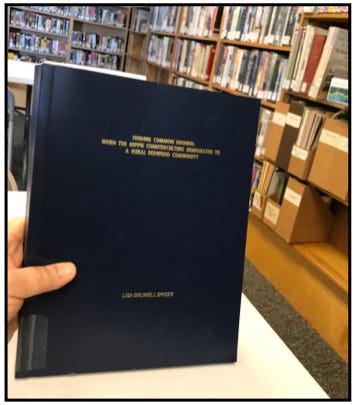Chapter 7: Conclusions
The final chapter of this ethnography makes meaning from the topics shared in my previous posts, such as reasons for living in Comptche, cultural traditions, and the volunteer fire department as common ground for fighting a common foe. Community conflict is the central theme. I looked at what caused it, how it was expressed, and found processes for how people resolved the underlying roots of conflict.
I found six answers to the question inspiring this research: How did a town experiencing polarized conflict make peace? In the next six posts I’ll share how the residents of Comptche created a sustainable, resilient community.
7.1 Back-to-the-Community
“This hall is now one hundred years old.” I spoke to a gathering of locals at the Comptche Community Hall. It was a cool June evening in 2013. Coastal fog had rolled in.
“It was 1911 when they began framing the building, and in May of 1913, they had a dedication ball. Right here in this room people gathered to dance and feast, to hold community meetings, like we are tonight.”
Local residents in attendance included people from Comptche’s settler and old-timer families, now-older back-to-the-landers, and newer community members migrating in since the 1980s. This was an informed, engaged group with personal interest in the study, which made it a wonderful experience to share. Some in the audience were research participants. I let that information remain anonymous unless they volunteered it themselves.
Presenting research back to the community it derives from is an important part of doing ethnography. This project took three years. The first was spent researching the counterculture, research design, submitting proposals to Human Subjects Review Board, writing and distributing my questionnaire, and applying for research grants. The middle year was in the field, my site being Comptche. I reconnected with people I knew during my youth, built relationships, recruited participants; I visited places and accessed local historical materials, archives, and county records. A method called participant-observation enabled me to learn through community volunteering. Because I grew up at my fieldsite, this study helped me better understand my youth in context of a unique place and time. The third year was spent sorting through my data to find patterns and meaning. I wrote drafts until at last, I presented my thesis to the Department of Anthropology at Western Washington University in 2012.

Back in the Comptche Community Hall, the audience was enthusiastic and receptive. True to tradition, there were homemade cookies and coffee after the presentation. People talked and looked through my research materials, laid out on the Hall’s large dining tables: books, charts, maps, photographs, newspaper clippings. I brought prints of the cultural domain diagrams I made to sort and organize the data, and a copy of my master’s thesis, Finding Common Ground: When the Hippie Counterculture Immigrated to a Rural Redwood Community (pictured above with a plain academic cover).
Attendees told me they understood the history of their community in a new way. There was a sense of appreciation for the work done in the 1970s to establish not only Comptche’s first general plan in 1978, but peace in the community.
During my fieldwork, whether participants or not, community members expressed both curiosity and concern about how would I represent the town. My objective, to understand a time and a place, was for the people living there to represent the town.
Doing ethnography in this community, we returned to a transformational time to better understand the cultural movement that shaped and transformed us in the 1970s.
My following outcomes are organized into six findings that relate the Comptche experience in the 1970s to cultural change:
Comptche Stories as a Collective Voice. Finding: many voices tell the story.
Feeling Bad About Feeling Groovy. Finding: impact of the hippie stereotype.
Embracing Structure. About the counterculture experiment in anti-structure.
Counterculture to Elder culture. About reviving strategies.
Comptche and the Civil Commons. Finding: the significance of common ground.
Resilient Community. Finding: a microcosmic model.
Each of these finding will be featured in the next six posts.
Up Next: 7.2 Comptche Stories as a Collective Voice
Resources for this post:
Spicer, Lisa Gruwell, 2012, c 2024. Finding Common Ground: When the Hippie Counterculture Immigrated to a Rural Redwood Community






